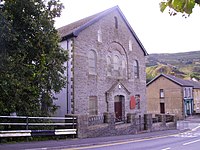Gelli, Rhondda
Gelli
|
|
|---|---|
 Mount Zion Chapel, Gelli |
|
| Gelli shown within Rhondda Cynon Taff | |
| OS grid reference | SS977948 |
| Principal area | |
| Ceremonial county | |
| Country | Wales |
| Sovereign state | United Kingdom |
| Post town | TREORCHY |
| Postcode district | CF41 7 |
| Dialling code | 01443 |
| Police | South Wales |
| Fire | South Wales |
| Ambulance | Welsh |
| EU Parliament | Wales |
| UK Parliament | |
| Welsh Assembly | |
Gelli is a village in the Rhondda Fawr valley, in the county borough of Rhondda Cynon Taff, Wales, situated on the southern bank of the Rhondda Fawr River. Gelli is a former coal mining village which is a district of the community of Ystrad.
The village of Gelli takes its name from a farm that was once found in the area, which translates from the Welsh language roughly as 'small wood or copse'. Before the industrialisation of the area there were few settlements in the area, mainly small agricultural and farm buildings. Archeological finds in the area have provided proof of earlier populations, mainly Bronze Age, though Gelli does house one of only two definite Romano-British finds in the Rhondda Valleys. Roman finds in the uplands of Glamorgan are scarce, but the settlement at Hen Dre'r Gelli, excavated in 1903, is the only undefended settlement of its type in the Rhondda. A lengthy archaeological report was published in 1906, but little remains of the site, with much destroyed during the construction of the Nant y Gwyddon refuse tip.
The farmlands of 19th century Gelli were owned by absentee landlords, like Crawshay Bailey and the Earl of Dunraven, who would gain from selling the areas when coal exploration began. The first pit sunk in Gelli was in the 1870s, undertaken by the firm owned by Edmund Thomas and George Griffiths. The Gelli Colliery was then purchased by brothers, John and Richard Cory who deepened the pit further. The colliery suffered a mining accident when a gas explosion in 1893 took the lives of five miners. Subsequently the pit was sold to the Powell Duffryn Company, who owned the mine until the nationalisation of the mining industry in 1947. A second pit was opened by David Davies in 1877, the Eastern Colliery, though this closed in 1937.
...
Wikipedia

